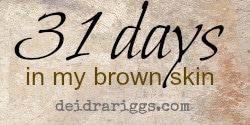Do you watch Parenthood? Last week’s episode was called “The Talk” and, if you have a free hour in your schedule, I encourage you to watch it. It’s about the N-word.
The N-word is tricky. In all of its forms. It carries baggage. There is a school of thought that believes black people can use the word with each other without it being considered derogatory. Some black people put the word “my” in front of the word and consider it a term of endearment. Some say, when the word ends in “a” instead of “er” it’s okay to say, if you’re black.
For the most part, everyone agrees that if you’re not black, the word is off-limits. It doesn’t have anything to do with being politically correct, and I can’t think of any situation where it would be okay for a white person to say the word, unless they were trying to explain to their children words that should never be said.
I can’t say the word. I can’t get it past my throat. Heck, I can’t get it past my fingertips, here on my computer keyboard.
There are some artists — poets, writers, rappers — who can use the word and I know it was the only word to use. When that happens, it is masterful and haunting, and it evokes an entire spectrum of emotion and loss and marginalization and destitution that no other word could conjure.
Then, there are all of the other choices. African-American, Black, People/Person of Color. (Words like “colored” and “negro” are remnants from a different time in history. In my opinion, using those words is like refusing to switch from dial-up to wifi; it’s not necessary to make the switch, but it sure would make it easier to communicate.)
For a long time, I always referred to myself as an African-American, or an American of African descent. There is a very good chance that is true. But my Sudanese friend tells me I’m not African. She says I am a Black American. I have to respect that. My Sudanese friend came to America when she was fifteen. She came here from a refugee camp, and she came here against her will. She tells me nothing about me is African. When she looks at me, she sees American. That’s a hard pill to swallow. So, while I know my skin isn’t truly black, like the crayon, I often call myself Black. And, sometimes I still say I’m African-American.
I use the phrase “people of color” when I’m referring to a multi-racial group.
One thing I’ve discovered over the years, is that all of this takes work. It’s easy to look at people who look different from me, and group them into one generalized category. And, until I take time to get to know their stories and to understand their culture, one generalized category is the best I can do. But, when I spend time getting to know them, and hearing their histories, I’m able to use words that speak of my relationship with them.
The desire to know and to use the “correct” terminology comes from many places. We don’t want to offend. We don’t want to look or sound stupid. Or racist. Or insensitive. Or ignorant. We want to treat one another with respect. Those are noble motivators. So, what if we let labels fall by the wayside? What if we simply describe my caramel skin and cornrowed hair, or her alabaster skin and aqua eyes?
I don’t know. Just thinking out loud. What do you think? How do you like to be identified?
(Note: I’m still in Haiti, with Help One Now. If you’d like to follow along with me, click over here.)
